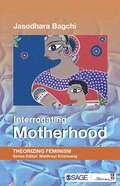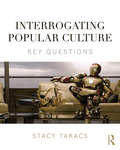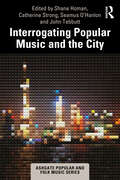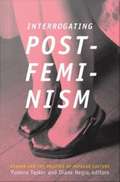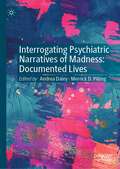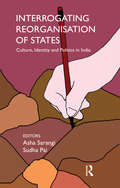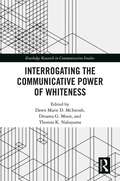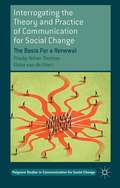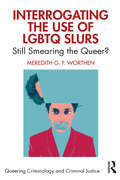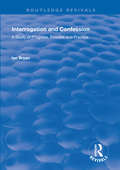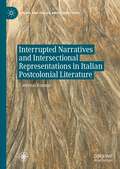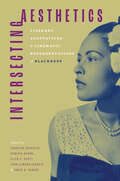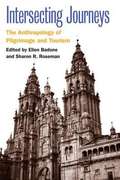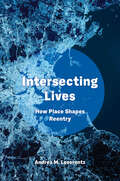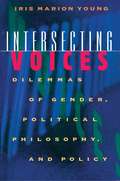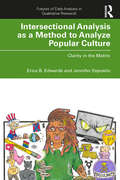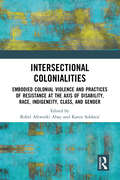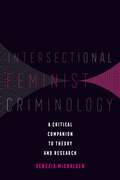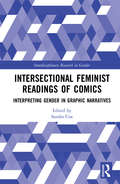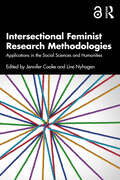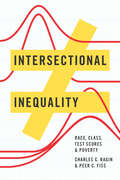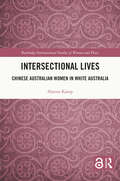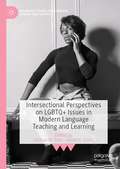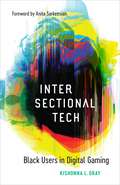- Table View
- List View
Interrogating Motherhood (Theorizing Feminism)
by Jasodhara BagchiExplores the many insights of Indian and western feminists analyses of motherhood both as ideology and as practice. Interrogating Motherhood, the fourth title in the Theorizing Feminism Series, reveals that an understanding of motherhood is vitally important to understanding Indian society. The ideas and practice of motherhood changed once India became a part of a global capitalist system. The book analyses motherhood both as ideology and as practice, and the complexities between motherhood and mothering where the concepts are glorified but the women remain subordinate. It further explores Indian and western feminists’ insights, examines the significance of mother goddesses, discusses regulations on motherhood in the wake of nation-building, and reveals the vulnerability of motherhood to the coercion of invasive technology and pressures of patriarchy where a woman must not only be a mother but also the mother of a son.
Interrogating Popular Culture: Key Questions
by Stacy TakacsInterrogating Popular Culture: Key Questions offers an accessible introduction to the study of popular culture, both historical and contemporary. Beginning from the assumption that cultural systems are dynamic, contradictory, and hard to pin down, Stacy Takacs explores the field through a survey of important questions, addressing: Definitions: What is popular culture? How has it developed over time? What functions does it serve? Method: What is a proper object of study? How should we analyze and interpret popular texts and practices? Influence: How does popular culture relate to social power and control? Identity and disposition: How do we relate to popular culture? How does it move and connect us? Environment: How does popular culture shape the ways we think, feel and act in the world? Illustrated with a wide variety of case studies, covering everything from medieval spectacle to reality TV, sports fandom and Youtube, Interrogating Popular Culture gives students a theoretically rich analytical toolkit for understanding the complex relationship between popular culture, identity and society.
Interrogating Popular Music and the City (ISSN)
by Catherine Strong Shane Homan Seamus O'Hanlon John TebbuttHow does popular music influence the culture and reputation of a city, and what does a city do to popular music? Interrogating Popular Music and the City examines the ways in which urban environments and music cultures intersect in various locales around the globe. Music and cities have been partners in an often clumsy, sometimes accidental but always exciting dance. Heritage and immigration, noise and art, policy and politics are some of the topics that are addressed in this critical examination of relationships between cities and music. The book draws upon an international array of researchers, encompassing hip hop in Beijing; the city favelas of Brazil; from Melbourne bars to European parliaments; to heritage and tourism debates in Salzburg and Manchester. In doing so, it interrogates the different agendas of audiences, musicians and policy-makers in distinct urban settings.
Interrogating Postfeminism: Gender and the Politics of Popular Culture
by Diane Negra Yvonne TaskerThis timely collection brings feminist critique to bear on contemporary postfeminist mass media culture, analyzing phenomena ranging from action films featuring violent heroines to the "girling" of aging women in productions such as the movie Something's Gotta Give and the British television series 10 Years Younger. Broadly defined, "postfeminism" encompasses a set of assumptions that feminism has accomplished its goals and is now a thing of the past. It presumes that women are unsatisfied with their (taken for granted) legal and social equality and can find fulfillment only through practices of transformation and empowerment. Postfeminism is defined by class, age, and racial exclusions; it is youth-obsessed and white and middle-class by default. Anchored in consumption as a strategy and leisure as a site for the production of the self, postfeminist mass media assumes that the pleasures and lifestyles with which it is associated are somehow universally shared and, perhaps more significantly, universally accessible. Essays by feminist film, media, and literature scholars based in the United States and United Kingdom provide an array of perspectives on the social and political implications of postfeminism. Examining magazines, mainstream and independent cinema, popular music, and broadcast genres from primetime drama to reality television, contributors consider how postfeminism informs self-fashioning through makeovers and cosmetic surgery, the "metrosexual" male, the "black chick flick," and more. Interrogating Postfeminism demonstrates not only the viability of, but also the necessity for, a powerful feminist critique of contemporary popular culture. Contributors. Sarah Banet-Weiser, Steven Cohan, Lisa Coulthard, Anna Feigenbaum, Suzanne Leonard, Angela McRobbie, Diane Negra, Sarah Projansky, Martin Roberts, Hannah E. Sanders, Kimberly Springer, Yvonne Tasker, Sadie Wearing
Interrogating Psychiatric Narratives of Madness: Documented Lives
by Andrea Daley Merrick D. PillingThis book challenges the perception of the psychiatric chart as a neutral and objective text. The chapters included in this book coalesce to reveal the psychiatric chart as a text that is, in fact, “storied” by institutional ideology that reflects, reinforces, reinterprets, and, at times, resists gendered, raced, sexualized, and classed norms, values, and presuppositions. Intersectional analysis highlights the nuanced ways in which dominant ideologies are activated in chart documentation to produce qualitatively specific psychiatric narratives of distress and related responses in the psychiatric institution. The book serves as a much-needed resource for mental health professionals, education and training programs, and researchers that meaningfully takes into account the social and structural materiality of people’s lives and its impact on experiences of distress. It will also appeal to scholars investigating equity in health care across the fields of Critical Psychology, Disability Studies, Social Work, Allied Health, Mad Studies and Social Justice.
Interrogating Reorganisation of States: Culture, Identity and Politics in India
by Asha SarangiThe volume analyses the complex historical and political context for the processes of state formation in independent India. It provides both a conceptual and empirical framework for an understanding of Indian democracy through the perspective of reorganisation of states.Following the recommendations of the States Reorganisation Commission (SRC) in 1956, the territorial boundaries of the states were redrawn. However, within a decade, the geo-linguistic and cultural-ideological criteria could not be considered satisfactory for the future division of states. With the formation of three new states (Chhattisgarh, Uttarakhand and Jharkhand) and the demand for Telangana statehood not accepted as yet, new dimensions and perspectives about state formation as a critical political practice have surfaced yet again in contemporary India. The book addresses a number of significant themes related to states reorganisation and its effects — questions of underdevelopment, size, political participation, governance, cultural identities — and also analyses the demand for smaller states. It focuses on different states, their historical and contemporary trajectory leading to the demand for territorial remapping and thus recognising specific political and cultural resources, and identities in the regions and sub-regions of states in India.The book will be useful for those studying politics, history, sociology, comparative politics and South Asian Studies.
Interrogating the Communicative Power of Whiteness (Routledge Research in Communication Studies)
by Thomas K. Nakayama Dawn Marie McIntosh Dreama G. MoonThe field of communication offers the study of whiteness a focus on discourse which directs its attention to the everyday experiences of whiteness through regimes of truth, embodied acts, and the deconstruction of mediated texts. This book takes an intersectional approach to whiteness studies, researching whiteness through rhetorical analysis, qualitative research, performance studies, and interpretive research. More specifically the chapters deconstruct the communicative power of whiteness in the context of the United States, but with discussion of the implications of this power internationally, by taking on relevant and current topics such as terrorism, post-colonial challenges, white fragility at the national level, the emergence of colorblind discourse as a pro-white discursive strategy, the relationship of people of color with and through whiteness, as well as multifaceted identities that intersect with whiteness, including religion, masculinity and femininity, social class, ability, and sexuality.
Interrogating the Theory and Practice of Communication for Social Change
by Pradip Ninan Thomas Elske van de FliertA new addition to the Palgrave Studies in Communication for Social Change series, this book sets the stage for subsequent books by identifying and analysing the current gaps in the field. It critically reviews the theory, practice and strategies of Communication for Social Change in relation to occurring structures, policies and discourses.
Interrogating the Use of LGBTQ Slurs: Still Smearing the Queer? (Queering Criminology and Criminal Justice)
by Meredith G. WorthenInterrogating the Use of LGBTQ Slurs: Still Smearing the Queer? provides a critical exploration of LGBTQ slurs through its innovative focus on hetero-cis-normativity and Norm-Centered Stigma Theory (NCST), the first-ever testable theory about stigma. Based on research with more than 3,000 respondents, the ways gender/sexuality norm-violators are stigmatized and disciplined as “others” through asserting and affirming one’s own social power are highlighted alongside other unique elements of slur use (joking and bonding). Through its fresh and in-depth approach, this book is the ideal resource for those who want to learn about LGBTQ slurs more generally and for those who seek a nuanced, theory-driven, and intersectional examination of how these LGBTQ prejudices function. In doing so, it is the most comprehensive scholarly resource to date that critically examines the use of LGBTQ slurs and thus, has the potential to have broad impacts on society at large by helping to improve the LGBTQ cultural climate. Interrogating the use of LGBTQ Slurs: Still Smearing the Queer? is important reading for scholars and students in the fields of LGBTQ studies, Gender Studies, Criminology, and Sociology.
Interrogation and Confession: A Study of Progress, Process and Practice (Routledge Revivals)
by Ian BryanFirst published in 1997, Interrogation and Confession has two important concerns. The first is with the structures and strategies that have evolved within the criminal justice system not only to entrench the confession as key item of prosecution evidence but also to legitimate the custodial interrogation of suspects by law enforcement personnel. The second major concern is with kinds of police-suspect encounter that appear in official accounts of custodial interrogation. Based upon a systematic analysis of prosecution papers associated with over 650 Crown Court cases, the author provides vivid and challenging insights into the nature of police-suspect relations and closely examines: the extent to which evidence is constructed (rather than elicited); how far formal rules impact upon the character and form of police-suspect relations during interrogation; the circumstances in which suspects elect or decline to cooperate with the police; and the extent to which records of custodial interrogation can be said to be complete, accurate and reliable.
Interrupted Life: Experiences of Incarcerated Women in the United States
by Rickie Solinger Paula C. Johnson Martha L. Raimon Tina Reynolds Ruby C. TapiaInterrupted Life is a gripping collection of writings by and about imprisoned women in the United States, a country that jails a larger percentage of its population than any other nation in the world.
Interrupted Narratives and Intersectional Representations in Italian Postcolonial Literature (Italian and Italian American Studies)
by Caterina RomeoThis book argues for the importance of adopting a postcolonial perspective in analysing contemporary Italian culture and literature. Originally published in Italian in 2018 as Riscrivere la nazione: La letteratura italiana postcoloniale, this new English translation brings to light the connections between the present, the colonial past and the great historical waves of international and intranational migration. By doing so, the book shows how a sense of Italian national identity emerged, at least in part, as the result of different migrations and why there is such a strong resistance in Italy to extending the privilege of italianità, or Italianness, to those who have arrived on Italian soil in recent years. Exploring over 100 texts written by migrant and second-generation writers, the book takes an intersectional approach to understanding gender and race in Italian identity. It connects these literary and cultural contexts to the Italian colonial past, while also looking outwards to a more diffuse postcolonial condition in Europe.
Intersecting Aesthetics: Literary Adaptations and Cinematic Representations of Blackness
by Charlene Regester, Cynthia Baron, Ellen C. Scott, Terri Simone Francis, and Robin G. VanderContributions by Cynthia Baron, Elizabeth Binggeli, Kimberly Nichele Brown, Priscilla Layne, Eric Pierson, Charlene Regester, Ellen C. Scott, Tanya L. Shields, and Judith E. Smith Intersecting Aesthetics: Literary Adaptations and Cinematic Representations of Blackness illuminates cultural and material trends that shaped Black film adaptations during the twentieth century. Contributors to this collection reveal how Black literary and filmic texts are sites of negotiation between dominant and resistant perspectives. Their work ultimately explores the effects racial perspectives have on film adaptations and how race-inflected cultural norms have influenced studio and independent film depictions. Several chapters analyze how self-censorship and industry censorship affect Black writing and the adaptations of Black stories in early to mid-twentieth-century America. Using archival material, contributors demonstrate the ways commercial obstacles have led Black writers and white-dominated studios to mask Black experiences. Other chapters document instances in which Black writers and directors navigate cultural norms and material realities to realize their visions in literary works, independent films, and studio productions. Through uncovering patterns in Black film adaptations, Intersecting Aesthetics reveals themes, aesthetic strategies, and cultural dynamics that rightfully belong to accounts of film adaptation. The volume considers travelogue and autobiography sources along with the fiction of Black authors H. G. de Lisser, Richard Wright, Ann Petry, Frank Yerby, and Walter Mosley. Contributors examine independent films The Love Wanga (1936) and The Devil’s Daughter (1939); Melvin Van Peebles's first feature, The Story of a Three Day Pass (1967); and the Senegalese film Karmen Geï (2001). They also explore studio-era films In This Our Life (1942), The Foxes of Harrow (1947), Lydia Bailey (1952), The Golden Hawk (1952), and The Saracen Blade (1954) and post-studio films The Learning Tree (1969), Shaft (1971), Lady Sings the Blues (1972), and Devil in a Blue Dress (1995).
Intersecting Journeys: The Anthropology of Pilgrimage and Tourism
by Ellen BadoneThe appeal of sacred sites remains undiminished at the start of the twenty-first century, as unprecedented numbers of visitors travel to Lourdes, Rome, Jerusalem, Santiago de Compostela, and even Star Trek conventions. Ethnographic analysis of the conflicts over resources and meanings associated with such sites, as well as the sense of community they inspire, provides compelling evidence re-emphasizing the links between pilgrimage and tourism. As the papers in this collection demonstrate, studies of these forms of journeying are at the forefront of postmodern debates about movement and centers, global flows, social identities, and the negotiation of meanings.
Intersecting Lives: How Place Shapes Reentry
by Andrea M. LeverentzFew would disagree that neighborhood and place are important dimensions of reentry from prison, but we have a less clear sense of why or how they matter—and we rarely get a view of the lived social-interactional dynamics between people returning from incarceration and receiving communities. Intersecting Lives focuses on the processes by which neighborhood and place influence reentry experiences and how these shape community life. Through interviews and ethnographic observations, Andrea M. Leverentz brings readers into three very different Boston communities. These places and the interactions they foster shape reentry outcomes, including reoffending, surveillance, relationship formation, and access to opportunities. This book sheds crucial new light on the processes of reentry and desistance, tying them intimately to space and community, including dynamics around race, gender, gentrification, homelessness, and transportation.
Intersecting Voices: Dilemmas of Gender, Political Philosophy, and Policy
by Iris Marion YoungIris Marion Young is known for her ability to connect theory to public policy and practical politics in ways easily understood by a wide range of readers. This collection of essays, which extends her work on feminist theory, explores questions such as the meaning of moral respect and the ways individuals relate to social collectives, together with timely issues like welfare reform, same-sex marriage, and drug treatment for pregnant women. One of the many goals of Intersecting Voices is to energize thinking in those areas where women and men are still deprived of social justice. Essays on the social theory of groups, communication across difference, alternative principles for family law, exclusion of single mothers from full citizenship, and the ambiguous value of home lead to questions important for rethinking policy. How can women be conceptualized as a single social collective when there are so many differences among them? What spaces of discourse are required for the full inclusion of women and cultural minorities in public discussion? Can the conceptual and practical link between self-sufficiency and citizenship that continues to relegate some people to second-class status be broken? How could legal institutions be formed to recognize the actual plurality of family forms? In formulating such questions and the answers to them, Young draws upon ideas from both Anglo-American and Continental philosophers, including Seyla Benhabib, Joshua Cohen, Luce Irigaray, Susan Okin, William Galston, Simone de Beauvoir, and Michel Foucault.
Intersectional Analysis as a Method to Analyze Popular Culture: Clarity in the Matrix (Futures of Data Analysis in Qualitative Research)
by Jennifer Esposito Erica B. EdwardsIntersectional Analysis as a Method to Analyze Popular Culture: Clarity in the Matrix explores how race, class, gender, sexuality, and other social categories are represented in, and constructed by, some of the most significant popular culture artifacts in contemporary Western culture. Through readings of racialized television sitcoms, LGBTQ+ representation in mainstream American music, the role of Black Panther in Western imperialist projects, and self-love narratives promoted by social media influencers, it demonstrates how novice and emerging researchers can use intersectional theory as an analysis method in the field of cultural studies. The case studies presented are contextualized through a brief history of intersectional theory, a methodological rationale for its use in relation to popular culture, and a review of the ethical considerations researchers should take before, during, and after they approach popular artifacts. Intended to be a textbook for novice and emerging researchers across a wide range of social science disciplines, this book serves as a practical guide to uncover the multiple and interlocking ways oppression is reified, resisted and/or negotiated through popular culture.
Intersectional Colonialities: Embodied Colonial Violence and Practices of Resistance at the Axis of Disability, Race, Indigeneity, Class, and Gender (Interdisciplinary Disability Studies)
by Karen Soldatić Robel Afeworki AbayThis book provides a rich synthesis of empirical research and theoretical engagements with questions of disability across different practices of colonialism as historically defined – post/de/anti/settler colonialism.It synthesises, critiques, and expands the boundaries of existing disability research which has been undertaken within different colonial contexts through the rich examination of recent empirical work mapping across disability and its intersectional colonialities. Filling an existing gap within the international literature through embedding the importance of grounding these within scholarly debates of colonialism, it empirically demonstrates the significance of disability for the broader scholarly fields of postcolonial, decolonial, and intersectional theories.It will be of interest to all scholars and students of disability studies, sociology, critical studies, sociology of race and ethic relations, intersectionality, postcolonial and decolonial studies, and human geography.
Intersectional Feminist Criminology: A Critical Companion to Theory and Research
by Venezia MichalsenThis pathbreaking book brings to bear a sweeping body of contemporary intersectional feminist work to disrupt the entire discipline of criminology. Women have been largely absent from criminological theory, research, policy, and practice. This fresh, conversational book critiques the field's dominant theories by analyzing gendered patterns of perpetration and victimization and challenging traditional criminological perspectives on characteristics such as race and queerness. Designed as a rebuttal to conventional criminology textbooks, the book mirrors standard course content through an intersectional feminist lens, offering students a valuable opportunity to question the field's underpinnings and forge a new path to understanding the true meaning of justice. Organized in fourteen chapters, each chapter includes accessible learning aids for students: A review of how traditional criminology textbooks cover the topic Critical perspectives on the topic Critical thinking breaks Intersectional Feminist Criminology is a timely intervention and companion to the curriculum that helps to imagine a new world and ultimately lays out a clear abolitionist vision as an alternative to the American criminal legal system.
Intersectional Feminist Readings of Comics: Interpreting Gender in Graphic Narratives (Interdisciplinary Research in Gender)
by Sandra CoxIntersectional Feminist Readings of Comics collects several theoretically informed close reading of comics and graphic literature that apply an intersectional feminist lens to the interpretation of several contemporary North American graphic narratives. The essays examine use a range of interpretive lenses drawn from theoretical models used in contemporary aesthetics, media studies, and literary criticism to analyze mainstream figures like DC’s Catwoman and Marvel’s Miss America and Doctor Strange, to contextualize historical and speculative comics by Indigenous American illustrators, and to explicate autography by critically lauded Jewish, queer and female cartoonists. In the first half of the book, the chapters examine ways in which superhero comics and the cinematic and televisual adaptations thereof, reify, revise and reject gender parity, systemic misogyny and heteropatriarchy through visual and textual rhetorics of representation. In the second part of the volume, the chapters look at the ways that feminist interpretive practices illuminate the radical work undertaken by cartoonists from historically marginalized communities in the U.S. and Canada. Across both halves, readers will find applications of longstanding feminist critical traditions, like ecofeminism, as well as new intersectional extrapolations of narratology, autobiographical studies, and visual rhetoric, which have been applied to the selected comics in insightful and innovative ways. This is a lively and varied collection suitable for students and scholars in gender studies, cultural studies, media studies and literary studies.
Intersectional Feminist Research Methodologies: Applications in the Social Sciences and Humanities
by Jennifer Cooke and Line NyhagenIntersectional Feminist Research Methodologies: Applications in the Social Sciences and Humanities is a multi-disciplinary volume in which emerging and established scholars present new feminist research methods and re-evaluate existing approaches.This collection examines how both new and established feminist methods address intersecting identities and structures of inequality including gender, race, sexuality, and class. Each chapter provides a case study of a methodology or methodologies that have been adopted, developed, or adapted within the author's field – including sociology, criminology, political science, history, literature, and performance studies. The volume articulates the importance of knowledge production that arises from the situated and lived experiences of individuals, groups, and communities. It discusses how we survive as feminists in today’s neoliberal universities, and includes research on trans and nonbinary people, Indonesian history and the #MeToo movement, world-literature from the Philippines, memory work, and crime on the London transport network. The contributors engage with intersectionality in different ways but collectively they demonstrate the pervasiveness of intersectional thinking and practice in feminist scholarship today.Intersectional Feminist Research Methodologies will be of value to both undergraduate and graduate students conducting research, as well as doctoral researchers and more established feminist researchers.
Intersectional Inequality: Race, Class, Test Scores, & Poverty
by Charles C. Ragin Peer C. FissFor over twenty-five years, Charles C. Ragin has developed Qualitative Comparative Analysis and related set-analytic techniques as a means of bridging qualitative and quantitative methods of research. Now, with Peer C. Fiss, Ragin uses these impressive new tools to unravel the varied conditions affecting life chances. Ragin and Fiss begin by taking up the controversy regarding the relative importance of test scores versus socioeconomic background on life chances, a debate that has raged since the 1994 publication of Richard Herrnstein and Charles Murray’s TheBell Curve. In contrast to prior work, Ragin and Fiss bring an intersectional approach to the evidence, analyzing the different ways that advantages and disadvantages combine in their impact on life chances. Moving beyond controversy and fixed policy positions, the authors propose sophisticated new methods of analysis to underscore the importance of attending to configurations of race, gender, family background, educational achievement, and related conditions when addressing social inequality in America today.
Intersectional Lives: Chinese Australian Women in White Australia (Routledge International Studies of Women and Place)
by Alanna KampIntersectional Lives explores the varied experiences of Chinese Australian females across time and place during the White Australia Policy era (1901-1973). Chinese Australian women’s personal reflections are examined alongside postcolonial feminist readings of official records to illustrate how their everyday lives were influenced by multiple and fluid identities and subject positions including migrant, mother, daughter, wife, student, worker, entrepreneur and cultural custodian. This book provides new ways to conceptualise Chinese females in the diaspora as gendered, classed, culturally varied and racialised individuals with multiple forms of oppression, agency and mobility. It offers a revision of patriarchal understandings of Chinese Australian history and broader understandings of overseas Chinese migrations and settlement experiences. It also demonstrates how historical geography, informed by postcolonial feminist approaches, can facilitate more nuanced understandings of past (and present) times and places that include women’s diverse experiences at the domestic, local, national and international scale. This book will appeal to social and cultural geographers with additional audiences of interest in history and historical geography, ethnic and racial studies, gender studies, diaspora studies, migration studies, and gender and feminist studies.
Intersectional Perspectives on LGBTQ+ Issues in Modern Language Teaching and Learning (Palgrave Studies in Language, Gender and Sexuality)
by Joshua M. Paiz James E. CodaThis edited book examines how sexuality and sexual identity intersect and interact with other identities and subjectivities – including but not limited to race, religion, gender, social class, ableness, and immigrant or refugee status – to form reinforcing webs of privilege and oppression that can have significant implications for language teaching and learning processes. The authors explore how these intersections may influence the teaching of different languages and how pedagogies can be devised to increase equitable access to language learning spaces. They seek to open the conversation on intersectional issues as they relate to sexuality and language teaching and learning, and provide a conversational space where readers can engage with the notion of intersectionality. This book will be of interest to students and scholars of applied linguistics and language education, gender and LGBTQ+ studies, and sociolinguistics, outlining possible future directions for intersectional research.
Intersectional Tech: Black Users in Digital Gaming
by Kishonna L. GrayIn Intersectional Tech: Black Users in Digital Gaming, Kishonna L. Gray interrogates blackness in gaming at the intersections of race, gender, sexuality, and (dis)ability. Situating her argument within the context of the concurrent, seemingly unrelated events of Gamergate and the Black Lives Matter movement, Gray highlights the inescapable chains that bind marginalized populations to stereotypical frames and limited narratives in video games. Intersectional Tech explores the ways that the multiple identities of black gamers—some obvious within the context of games, some more easily concealed—affect their experiences of gaming. The normalization of whiteness and masculinity in digital culture inevitably leads to isolation, exclusion, and punishment of marginalized people. Yet, Gray argues, we must also examine the individual struggles of prejudice, discrimination, and microaggressions within larger institutional practices that sustain the oppression. These “new” racisms and a complementary colorblind ideology are a kind of digital Jim Crow, a new mode of the same strategies of oppression that have targeted black communities throughout American history. Drawing on extensive interviews that engage critically with identity development and justice issues in gaming, Gray explores the capacity for gaming culture to foster critical consciousness, aid in participatory democracy, and effect social change. Intersectional Tech is rooted in concrete situations of marginalized members within gaming culture. It reveals that despite the truths articulated by those who expose the sexism, racism, misogyny, and homophobia that are commonplace within gaming communities, hegemonic narratives continue to be privileged. This text, in contrast, centers the perspectives that are often ignored and provides a critical corrective to notions of gaming as a predominantly white and male space.
